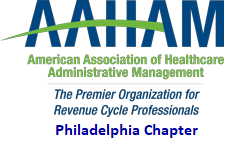AAHAM certification options include:
Certified Revenue Cycle Executive (CRCE)
Certified Revenue Cycle Professional (CRCP)
Certified Revenue Integrity Professional (CRIP)
Certified Revenue Cycle Specialist (CRCS)
Certified Compliance Technician (CCT)
Healthcare patient financial services professionals across the nation and around the globe are looking for an edge… a way to work smarter, build a career, stay informed and make the right contacts; an AAHAM certification helps you achieve all of these goals.
What is Executive (CRCE) certification?
Executive Certification is an extensive online proctored exam directed to all senior and executive leaders within the healthcare revenue cycle industry, to help equip them for strategic management of the business. This certification possesses the highest level of difficulty combining content knowledge of the business with critical thinking and communication skills. AAHAM offers two types of Executive certification; one focused on the revenue cycle within an institutional (hospital, health system) environment and the other focused on the revenue cycle in a professional (physician, clinic) environment. Dual certification is available for those interested in obtaining certification in both specialties.
CRCE FAQs
What is Professional (CRCP) certification?
Professional Certification is an online proctored exam directed to supervisors and managers in the revenue cycle industry, to validate their knowledge and skills. This certification is for the individual who desires confirmation and recognition of their expertise and/or for those who aspire to the executive level certification. AAHAM offers two types of Professional certification; one focused on the revenue cycle within an institutional (hospital, health system) environment and the other focused on the revenue cycle in a professional (physician, clinic) environment. Dual certification is available for those interested in obtaining certification in both specialties.
CRCP FAQs
What is Revenue Integrity Professional (CRIP) certification?
The Revenue Integrity Professional (CRIP) is an online proctored exam directed to anyone in the revenue cycle industry to help ensure that facilities effectively manage their charge master, and bill and document appropriately for all services rendered to a patient. This certification requires an in-depth, working knowledge of various revenue cycle areas and proper skill sets needed to increase revenue and reimbursement for facilities. It also ensures that proper charging takes place to maintain compliance within the insurance payer programs.
CRIP FAQs
What is Specialist (CRCS) certification?
Specialist certification is an online proctored exam that tests the proficiency of staff involved in the processing of patient accounts and to prepare them for the many details needed to perform their daily job duties. AAHAM offers two types of Specialist Certification; one focused on the revenue cycle within an institutional (hospital, health system) environment, the other focused on the revenue cycle in a professional (physician, clinic) environment. Dual certification is available for those interested in obtaining certification in the institutional and professional specialties.
CRCS FAQs
“The University of Pennsylvania Health System (UPHS) began a voluntary CRCS certification program to support staff level persons working as part of the revenue cycle. UPHS pays for any candidate to take the test up to three times. The program is very popular with staff, which recognizes the investment that UPHS is making in their personal development. The Patient Accounting Department now offers a reward for passing the exam, paid out annually each year on the individual’s certification anniversary for as long as they maintain their certification.”
Thomas McCormick, CRCE
University of Pennsylvania Health Systems
What is Compliance (CCT) certification?
Compliance certification is an online proctored exam that thoroughly tests competencies in healthcare compliance for all staff involved in the processing of patient accounts. It is intended to meet the annual employee compliance training requirements and to support individuals with professional compliance responsibilities in both institutional (hospital, health system) and professional (physician, clinic) settings.
CCT FAQs



